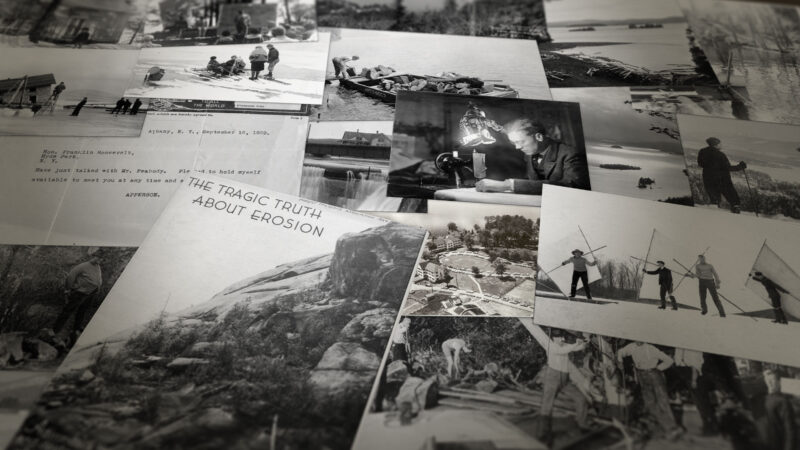George Foster Peabody was one of the leading philanthropists of his day, and he left a remarkable legacy at Lake George. Apperson probably took notice of Peabody’s activities much earlier, but by 1923 the two men had begun exchanging letters. They had a shared interest in preserving the islands at Lake George, including Dome Island, and in the plans to create a Lake George Park. Peabody spoke out in defense of Sylvia Loines, in 1925, when she wrote an editorial in a local newspaper. He agreed to help Apperson get in touch with George O. Knapp, to try and persuade him to let the state take over much of Knapp’s land on the Eastern side of Lake George, including Paradise Bay. Among the many interesting letters in the file are several intriguing discussions of political strategy (concerning the bobsled run at Lake Placid) between Franklin D. Roosevelt, Foster Peabody, and John Apperson. Peabody agreed to become a board member of Apperson’s organization, the New York Forest Preserve Association, in 1934, along with Irving Langmuir, Ellwood Rabenold, and E. MacDonald Stanton. We don’t know all the details, but Peabody probably exerted his influence with the General Electric Company to operate a summer camp for women on French Point, starting around 1920, and when the camp closed operations, around 1930, Peabody may have tried to persuade GE officials to sell French Point to the state. However, by the time of Peabody’s death, in 1938, John Apperson came up with the idea of raising funds to create a Memorial for Peabody, then purchasing the land from GE, and transferring ownership to the State of New York. That is why there is now a plaque on French Point dedicated to George Foster Peabody, and recognizing all his good works benefitting Lake George.
- March 23, 1923 – George Foster Peabody to William K. Bixby re: “Hope it will be possible for the State to acquire Dome Island. I confess… that I wish our Conservation Commissioner were somewhat more keen and energetic in his progress towards the consummation of the State’s wise projects at Lake George.”
- August 17, 1923 – George Foster Peabody to JSA re: Crown Island; Triuna Island, “where Mr. and Mrs. Spencer Trask lived, South of Bolton Bay”; “Hopes Gov. Smith will take the trip quietly, rather than in the midst of a crowd of officials”
- July 25, 1925 – George Foster Peabody to Editor, Lake George Mirror re: “shocked at language used… in your editorial response to Miss Loines.”
- July 29, 1925 – Ed Ames (Secretary to George Foster Peabody) to JSA re: “he expresses great satisfaction over your letter to the Lake George Mirror.” “…outrageous attack on Miss Loines.”
- November 19, 1929 – JSA to George Foster Peabody – re: “chance of getting an appropriation specifically for the purpose of protecting Paradise Bay land, in view of Mr. Knapp’s opposition.”
- December 20, 1929 – G. F. Peabody to F. D. Roosevelt re: “I think our friends Agar and Apperson are off on the question of the Lake Placid international sport opportunity…”
- December 29, 1929 – George Foster Peabody to Governor Roosevelt – re: Apperson’s comeback; “He is right about Whiteface; Lake Placid bobsled – Apperson has not talked it over with Dewey.”
- February 21, 1930 – G. F. Peabody to JSA re: Letter to Rabenold
- March 12, 1930 – JSA to G. F. Peabody re: attaching letters to Greely. Houghton, and Agar; re: Mr. Houghton: “I usually find him favoring the commercial interests –
- March 12, 1930 – JSA to John G. Agar (Association for the Protection of the Adirondacks) re: Mr. Houghton – “it is obvious that the proponents of the amendment are seeking other privileges…”
- March 20, 1930 – G. F. Peabody to W. W. Wemple, Jr. re: “earnest hope that Assembly Bill 798 proposing an amendment to the Constitution will not be passed.”
- April 16, 1930 – G. F. Peabody to JSA re: Thank you for enclosures. Mentions “my original from Mr. Woodbury; American Scenic and Historic Preservation Society; Diamond Island”
- November 29, 1930 – F. D. Roosevelt (Warm Springs) to G. F. Peabody re: Ed Flynn; Large building to be located on Lake George; “I don’t know what the powers of the Land Board are.”
